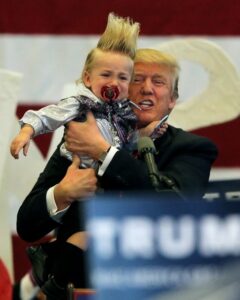Strange hair, billions in fortune and a magical ability to climb the polls despite statements that would sink other politicians. Long before Donald Trump terrified the U.S. establishment, Silvio Berlusconi was doing it in Italy.

Silvio Berlusconi, Rome, 20 January 2016 (EPA/Angelo Carconi)

Donald Trump, New Orleans, 4 March 2016 (EPA/Dan Anderson)
Strange hair, a billion-dollar fortune and an almost magical ability to keep climbing the polls despite missteps and toe-curling statements that would sink any other politician.
Years before Donald Trump terrified the U.S. establishment, Silvio Berlusconi was doing it in Europe.
The rise and rise of Trump has been watched with the same bemusement in Italy as elsewhere, but he has many similarities to that country’s most famous and in some ways most successful politician.
It is a comparison Trump might not like for many reasons, including the fact that Berlusconi’s fourth and last term as Italian prime minister ended in ignominy and the contempt of crowds of jeering Romans when the country came close to bankruptcy in 2011.
Like Trump, Berlusconi is a super-rich showman who used much of his own fortune to forge a political career marked by outrageous actions as well as words.
His gaffes at international summits and his politically incorrect statements became as legendary as his “bunga bunga” parties with starlets and call girls and the dozens of corruption and sex cases brought against him — although he has been convicted definitively only once.
Berlusconi’s buffoonery masked an acute political skill.
Like Trump, Berlusconi’s appearance helps keep him in the headlines. Trump is famous for his flamboyant blond quiff, Berlusconi for an eternal tan and — despite his 79 years — a short, dark hair weave that some say makes his head look like an airport runway. Like Trump, his huge business success and the glamorous women on his arm boosted his appeal to deeply conservative voters.
Berlusconi’s success, like Trump’s, was built on his claim to be different from generations of traditional politicians who had ruled Italy for 40 years until they were swept away in a huge corruption scandal in the early 1990s.
In fact, Berlusconi’s buffoonery masked an acute political skill; like Trump, he was a master of communicating directly with disgruntled voters, helped by a powerful media empire. He, too, spoke his mind, often in colorful language.
But Italy’s fragmented political system and myriad checks and balances, which sacrificed governability to prevent the rise of another dictator like Benito Mussolini, meant the country’s longest serving postwar premier could never aspire to the kind of power Trump would command as U.S. president.
Italy’s constitution may be a better bulwark against populist leaders than the U.S. one.
With the passing of time, Berlusconi has become as much a part of the well-worn political system as everybody else. His fortunes have waned sharply over the past two years, undermined by a ban from public office over a fraud conviction, more than 30 attempted prosecutions by magistrates he dismisses as communists and the rise of more nimble political rivals.
Telegenic current Prime Minister Matteo Renzi, 41, has overturned Berlusconi’s previously unchallenged media supremacy and dragged his stolid left-wing party more to the center.
In fact, the biggest threat to Renzi is not Berlusconi but former comic Beppe Grillo, whose 5-Star Movement is only a few percentage points behind the prime minister in popularity polls.
Grillo, not Berlusconi, may now be a closer Italian equivalent of Trump.
Grillo has the eye-catching hair — a wavy grey mop — and denounces the establishment in insulting, screaming rants, scarcely pausing for breath. But his refusal to cooperate with other parties in a system where governments are always coalitions would seem to keep him from national leadership.
It may be that the Italian constitution, for all its faults, is a better bulwark against populist leaders than the U.S. one.

Barry Moody was Africa Editor for Reuters for 10 years and Middle East editor for seven, during which time he led coverage of the 2003 Iraq war. He worked on every continent as one of the agency’s most experienced foreign correspondents and editors. His postings included Tanzania, Kenya, South Africa, Italy, Hong Kong, Australasia and the United States. He ran editorial operations in Italy, Spain, Greece and Portugal at the height of the EU debt crisis.

The trouble with all these comparisons is that they do not compare the actual substance of Trump’s statements, in so far that there is any, with anything similar uttered by the others, e.g. on Mexican rapists, Megyn Kelly’s menstruation, banning all Muslims entering, getting Mexico to pay for the ‘beautiful’ wall, waterboarding and ‘even worse,’ Carly Fiorina’s horrible face, Hillary’s ‘disgusting’ urination o whatever… the list is too long to go on.
I don’t think the substance matters as much as the perception, or the brand. Just consider yesterday’s results. People voted for Berlusconi fully aware of who and what he was, and the same goes for Trump, despite all the attack ads. I think Barry gets it right.